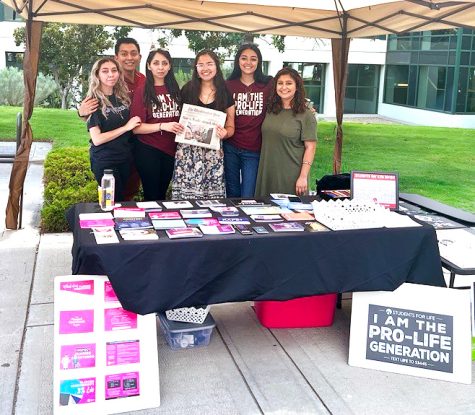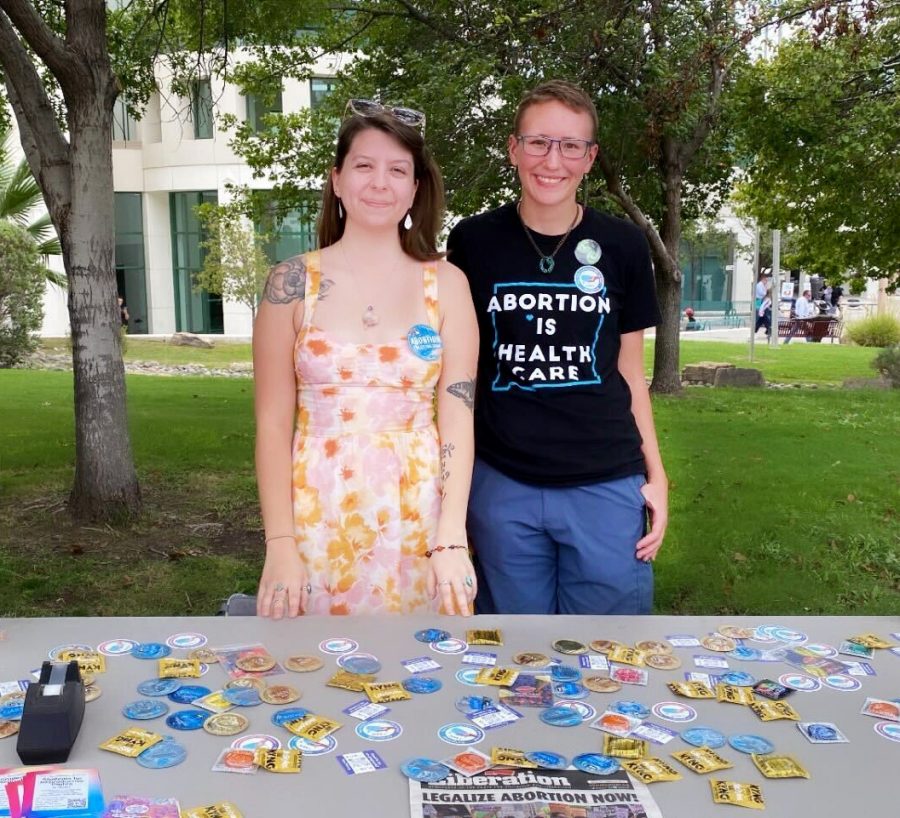Pro-Birth and Pro-Abortion: A Shallow View
Students for Reproductive Rights members pose for a photo at Aggie Carnival, Aug. 24, 2022.
So much of modern American discourse on controversial issues and is heavily saturated with over-generalization and dichotomization. One of these issues is the tension between the pro-life and pro-choice movements and has been heightened by the recent judicial precedential overturning of Roe v. Wade.
However, if we take a minute to look beyond the flash of headlines and Twitter feeds, perhaps there is more to the abortion debate than meets the eye.
It is important to note that I am no expert on the positions of either side. I am a mere layman on this topic, and this is an attempt to grow in my own personal understanding as well as help others do the same. This is not meant to be a definitive answer to questions regarding abortion ethics; this is simply an attempt to understand, empathize and piece together two opposing worldviews.
Similarities
Something I was shocked to discover when conducting my interviews was the high number of shared values between both sides. Representatives of both organizations share in the value of providing resources to pregnant people. For pro-life, I interviewed Janet Mendoza, who is the current treasurer for Students for Life.
According to Mendoza, there are many free resources provided by pro-life organizations.
“We have three pregnancy tests, free ultrasounds that we can connect them to. We can get them free diapers, free wipes, free formula, clothes, toys, pretty much all essentials for babies,” Mendoza said.
For pro-choice, I interviewed Gauge Burnett, current president for Students for Reproductive Rights.
Burnett, emphasized a similar sentiment. “Pro-choice ethics are fundamentally rooted in the idea that this access to health care…is a human right. The ability to have children, [to] not have children, to build safe and sustainable communities for the families that we live in,” he said.
Both organizations emphasized the need for more education regarding abortion.
“There are some sources on the Internet in particular that claim that there is a way to reverse an abortion…. and there’s no evidence to support this,” Burnett said. “…Making sure that people are educated on the fact that once they make the decision, once they’ve started down this road, there really is no going back, I think, is important,” he added.
Mendoza affirmed this sentiment as well. “Education played a very big role in why I am pro-life,” Mendoza said. “Just learning about fetal development and the actual abortion procedures that there [are]…. It wasn’t just the one-day thing.” she stated.
Abortion is a significant medical procedure, so having access to correct information is important in making a decision. Both sides seemed to agree here.
It’s also important to note that information was a key tool that both sides used during their respective interviews. For someone who has views aligning with pro-life, that might be leveraging science to show that a human life starts at conception starts at conception.
For someone who is pro-choice, that might mean leveraging the impact abortion restriction has on other types of medication or medicated contraceptives.
A third similarity that was found was the mutual distaste for how politicized the abortion issue has become. In Burnett’s opinion, the polarization of politics makes it difficult to engage across the aisle on issues as critical as abortion.
For Mendoza, there appears to be a “fakeness” in politics that leverages abortion for ulterior motives. “I even think politicians use the abortion matter just for that for votes,” Mendoza said, “If you’re a Democrat, you’re just assumed to be pro-choice, and if you’re a republican, you’re just assumed to be pro-life, and that’s not always true.”
Differences
Of course, do not just have similarities. There were many differences between the two parties as well. The first major difference was between the direct values of reproductive autonomy vs. fetal rights.
In Mendoza’s view, the life of a fetus is equal to the life of an infant, which makes abortion murder. “It’s always going back to the life of the child. In What circumstance is it okay, to kill a child… whether it’s outside of the womb or inside of the womb,” Mendoza said, “…Understanding that a human life begins at conception…. when is it okay to kill it then?”
However, Burnett sought that the focus of abortion access allows isn’t just about the fetus. Rather, it’s about agency and a pregnant person’s autonomy. “Abortion is fundamentally rooted in human rights, and making sure that people can have a family in the way that they want to, at the time that they want to, or in their environment that they’re able to create,” Burnett said.
The perceived weight of sexual encounters with partners should be viewed to always considering the outcome being a possible pregnancy. “If pro-life people want to prevent abortions, then they should be all about contraception. It should be all about Sex Ed. They should be passing out condoms like candy,” Burnett argued.
For him, the solution is not to limit sex, but to educate on matters of sex. In Mendoza’s understanding, the potential unwanted outcomes of sex regardless of protection or contraceptives are critical.
“I personally believe consent to sex is consent to pregnancy,” she said. “You have to know that there’s always a chance that you might get pregnant.” Mendoza concluded.

If you are on one side of this debate, it might be easy to look across the aisle and reduce the other side to a group that just wants to cause trouble. I learned that this is false for both sides.
“[Some people] say we’re just like trying to convince women to have their child, and then after that it’s like we forget about them…. That’s not it at all,” Mendoza said, “[We] give them–again like I said–those free resources [like] diapers, wipes, formula, all baby necessities. We’re doing our best to try to provide that completely free of charge.”
“Being pro-choice does not mean being pro-abortion,” Burnett said. “I talked to a couple of [other pro-choice] people who said, ‘You know I don’t want there to be more abortions, but I want people who need them to be able to access them.’ And others had had similar perspectives.” Burnett stated.
If you would like to get in touch with either organization that these students represent, you can find Students for Life here and Students for Reproductive Rights here on Instagram.

Elijah is working his way through his second year at NMSU and his second year at The Round Up as a Lifestyle Writer. He is currently pursuing a major in...

